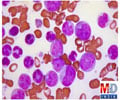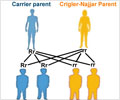
The researchers used a combination of genomic approaches, including next-generation sequencing and mass spectrometry based genotyping, to identify mutations in samples of bone marrow from 439 patients with MDS. They then examined whether the mutation status for each gene was associated with clinical variables and overall survival.Clinicians currently use scoring systems to classify MDS patients into different risk groups based on clinical features of their disease, but mutations in individual genes are not currently used. Some patients currently predicted to have low risk disease progress rapidly. "In this study we identified mutations in several genes that predict a worse prognosis for patients than we would have expected using the most commonly used clinical scoring system (the International Prognostic Scoring System for MDS, or IPSS)," said Dr. Ebert. Nearly a third of the patients in this study were found to have mutations in one or more of the five prognostic genes identified. If physicians knew that one of their low risk patients had such a mutation, they might decide to offer them more aggressive treatment or monitor them more closely.
Prior studies have suggested that mutations in individual genes can change the predicted prognosis of patients in MDS, but often included only a small number of patients or only considered mutations in a few genes. This study is the first to examine a large number of genes in such a large group of patients, allowing the researchers to determine how frequently mutations in different genes occurred and how often they overlapped with each other. This also allowed them to determine which mutations were the most important independent predictors of prognosis.
Moving forward, researchers hope to identify mutations that predict response to individual therapies. They expect that this genetic information will be used clinically as part of a novel prognostic scoring system and as predictors of therapeutic responses. This will allow us to further individualize the care of patients with MDS.
Source-Eurekalert















